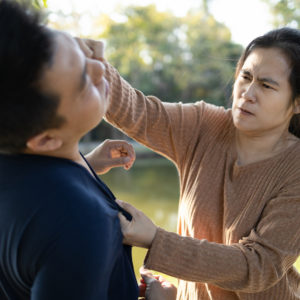 We realize that there are various reasons why spouses stay in abusive relationships. And even though Marriage Missions doesn’t condone abuse in any way, we can’t tell you what to do. But we want to give you some safety plan guidelines. We believe they could help you to better protect yourself, whether you leave or not.
We realize that there are various reasons why spouses stay in abusive relationships. And even though Marriage Missions doesn’t condone abuse in any way, we can’t tell you what to do. But we want to give you some safety plan guidelines. We believe they could help you to better protect yourself, whether you leave or not.
We also know that not all of you have access to the same agencies that are available here in the USA. Many of you live in other countries where the laws and customs don’t protect you from domestic violence. In some countries spousal abuse is even permitted. For this reason, your life is in even more danger if you leave your home.
Abuse is cowardly, controlling, and wrong —even if it is permitted in your country. And even though you don’t feel like you can take advantage of the help that is available here (although we wish you would) there are still some ways in which you can protect yourself.
Guidelines for Safety
Below are some guidelines provided from the “National Center for Victims of Crime.” Glean through them, and use whatever will help you to protect yourself if you are being abused:
One of the most important things you can do when developing your safety plan is to talk to a victim advocate who can help you fully consider safety issues. They can also help you understand your legal rights, and identify community resources (e.g., shelters, sources of financial assistance, or food banks).
You can locate a victim advocate through a local domestic violence agency, which provides services at no-charge to victims. The National Crime Victim Helpline (1-800-FYI-CALL) can also help you prepare a safety plan and find victim assistance within your own community.
The following safety suggestions have been compiled from safety plans distributed by state domestic violence coalitions from around the country. Following these suggestions is not a guarantee of safety. But they could help improve your safety situation.
Personal Safety with an Abuser:
• Identify your partner’s use and level of force. This is so that you can assess danger to you and your children before it occurs.
• Try to avoid an abusive situation by leaving.
• Identify safe areas of the house where there are no weapons and where there are always ways to escape. If arguments occur, try to move to those areas.
• Don’t run to where the children are as your partner may hurt them as well.
• If violence is unavoidable, make yourself a small target. Dive into a corner and curl up into a ball with your face protected. Position your arms around either side of your head, with your fingers entwined.
Also:
• If possible, have a phone accessible at all times and know the numbers to call for help. Know where the nearest pay phone is located. Know your local battered women’s shelter phone number. Don’t be afraid to call the police.
• Let trusted friends and neighbors know of your situation. Develop a plan and visual signal for when you need help.
• Teach your children how to get help. Instruct them not to get involved in the violence between you and your partner. Plan a code word to signal that they should get help or leave the house.
• Tell your children that violence is never right, even when someone they love is being violent. Tell them that neither you nor they are at fault, and that when anyone is being violent, it is important to keep safe.
• Practice how to get out safely. Practice with your children.
Additionally:
• Plan for what you will do if your children tell your partner of your plan or if your partner otherwise finds out about your plan.
• Keep weapons like guns and knives locked up and as inaccessible as possible.
• Make a habit of backing the car into the driveway and keeping it fueled. Keep the driver’s door unlocked and the other doors locked for a quick escape.
• Try not to wear scarves or long jewelry that could be used to strangle you.
• Create several plausible reasons for leaving the house at different times of the day or night.
• Call a domestic violence hotline periodically to assess your options and get a supportive, understanding ear.
Getting Ready to Leave
• Keep any evidence of physical abuse, such as photographs of bruises and torn clothing.
• Know where you can go to get help. Tell someone what is happening to you.
• If you are injured, go to a doctor or an emergency room. And report what happened to you. Ask that they document your injuries.
• Plan with your children and identify a safe place for them (for example, a room with a lock or a friend’s house where they can go for help). Reassure them that their job is to stay safe, not to protect you.
• Contact your local battered women’s shelter. Find out about laws and other resources available to you before you have to use them during a crisis.
Make Sure You:
• Keep a journal of all violent incidents, noting dates, events, and threats made.
• Acquire job skills as you can, such as learning to type or taking courses at a community college.
• Try to set money aside or ask friends or relatives to hold money for you.
• Store some belongings with a friend or relative. Leave clothing, medications, your Social Security card, a credit card (if possible), and citizenship documents. Also leave children’s school/medical records, children’s toys, and insurance information. Plus, leave copies of birth certificates, money, and other valued personal possessions with them.
The Day You Leave
• Leave when it is least expected, for example, during times of agreement and calm.
• Create a false trail. Call motels, real estate agencies, schools in a town at least six hours away from where you plan to relocate. Ask questions that require a call back to your house in order to leave those phone numbers on record.
General Guidelines for Leaving an Abusive Relationship
• Make a plan for how you will escape and where you will go.
• Plan for a quick escape.
• Put aside emergency cash as you can.
• Hide an extra set of car keys.
• Take with you important phone numbers (of friends, relatives, doctors, schools, etc.). Also include the following important items:
– Driver’s license
– Regularly needed medication
– List of credit cards (account number and date of expiration) held by self or jointly, or the credit cards themselves if you have access to them
– Pay stubs
– Checkbooks and information about bank accounts and other assets.
If time is available, also take:
– Citizenship documents (such as your passport, green card, etc.)
– Titles, deeds, other property information, and tax returns
– Medical records
– Children’s school records and immunization records
– Insurance information
– Copy of marriage license, birth certificates, will, and other legal documents
– Verification of Social Security numbers
– Welfare identification
– Valued pictures, jewelry, or personal possessions.
After Leaving the Abusive Relationship
If you are getting a restraining order and the offender is leaving:
• Change your locks and phone number.
• Change your work hours and route taken to work.
• Plus, change the route you take to transport children to school.
• Keep a certified copy of your restraining order with you at all times.
• Inform friends, neighbors, and employers that you have a restraining order in effect.
• Give copies of the restraining order to employers, neighbors, and schools along with a picture of the offender.
• If available in your community, register with VINE Protective Order™ to be notified immediately when the order is served, when hearings will be held, and when any amendments to the order are filed. Ask your victim advocate or sheriff’s office about this service.
• Call law enforcement to enforce the order.
• Carry a charged cell phone preprogrammed to 911.
If You Leave:
• Consider renting a post office box for your mail.
• Be aware that addresses are listed on restraining orders and police reports.
• Be careful to whom you give your new address and phone number.
• Change your work hours if possible.
• Alert school authorities about the situation.
• Consider changing your children’s schools.
• Reschedule any appointments that the offender is aware of when you leave.
• Use different stores and frequent different social spots.
• Alert neighbors and request that they call the police if they feel you may be in danger.
Also:
• Talk to trusted people about the violence.
• Replace wooden doors with steel or metal doors.
• Install security systems if possible.
• Install a lighting system that turns on when a person is coming close to the house (motion sensitive lights).
• Tell people you work with about the situation and have your calls screened by one receptionist if possible.
• Tell people who take care of your children which individuals are allowed to pick up your children. Explain the situation to them. Also, provide them with a copy of the restraining order.
• Call the telephone company to request caller ID. Ask that your phone be blocked so that your partner nor anyone else will be able to get your new, unlisted phone number.
• Receive ongoing support from domestic violence and mental health service providers.
All rights reserved for these guidelines. Copyright ©2006 by the National Center for Victims of Crime. This information may be freely distributed, provided that it is distributed free of charge, in its entirety and includes this copyright notice.
— Additionally —
The following linked articles can help you if you feel threatened in your marriage by domestic violence. We recommend you prayerfully read, and glean through them. See if there are certain steps you can take now that could help you in the future to stay safe:
• SECRET FINANCIAL ESCAPE PLAN FOR DOMESTIC VIOLENCE
• LEAVING YOUR SPOUSE BECAUSE OF ABUSE
More from Marriage Missions
Filed under: Abuse in Marriage







(ZAMBIA LIVING IN CHINA) I was hit for the first time by my husband for refusing to go back to our home country just yet. I wanted to be done with some things like complete the course I was doing and give enough notice at work in order to acquire a reference letter.
What shocked me the most was that he did not act on impulse, instead he waited and tried to keep me locked up in the bedroom, but when he realized my kids didn’t want to be separated from me, he pounced any way in full view of my kids and my maid, hitting me across the face and kicking me repeatedly in my ribs while I was down.
I have agreed to go home so I can be oficially divorced from him, but deep down I keep thinking that maybe, it was a one time thing. Please help me.
(ZAMBIA) Mubanga, my sister. It’s really sad what you are going through. 3 months in a relationship with my husband, he raised a hand at me. I thought it was because I had crossed him. We have been married 9 years and currently on separation. He has hit me several times during the time I have been with him.
I don’t know what kind of man you are married to, but most Africans think abuse is key in marriage. Culturally, you and I both know that we are told not to leave husbands even if they beat us up. We need biblical advice on this. Because really, violence in a marriage could be so overwhelming.
(ZIMBABWE) It is not a once off thing when your husband beats you. It is just the beginning. Nothing that you do should make him beat you up. I have noted that men usually beat up their spouses because they have some inferiority complex or they are trying to cover up for an affair. Probably the course you are doing bruises his ego.
(SOUTH AFRICA) Are there any organisations in South Africa that provide financial assistance that will enable women to leave an abusive relationship?
(TANZANIA) I read somewhere that there is a cycle of violence. And I agree with Georgina that if he has hit you it is just the beginning. He will do it again because he has seen that nothing happened– (police reporting etc). The first time my husband hit me, I was stunned. I could not believe it was happening, did not defend myself… I just sat there shocked and took the beating. He stopped when he realized that our 5 year old daughter was standing a few feet away too shocked to even cry!
Yes, he did beat me up again a couple of times more in the course of years. The last time my daughter, at that time a teenager, saw it all. AGAIN he stopped when he realised she was watching us in terror! I am still in the marriage but with a plan…. of getting financially, emotionally and many ways independent then moving on. So sisters…. violent men never stop. It is insecurity combined with cruelty in them that prompts attacks. They cannot change at that age sweethearts, they will keep doing it. So if you stick around, be on guard and make an exit plan… hope you can get out before it is too late cause these guys can kill you. During my last beating he was trying to choke and strangle me. May God protect and guide you.
(NIGERIA) I am engaged to be married although my husband-to-be has neva beaten me before, he displays most of the characteristics of an abuser. After reading the safety plan guidelines, it made the situation very real to me and scary. He always wants to have his way, but apologizes almost immediately. This happens so often that I don’t regard the apologies anymore.
I know that with God all things are possible, but after reading these people’s testimonies I am really scared of being in the same situation. It really doesn’t help that I was brought up in a broken home. Please advise me, what do I do?